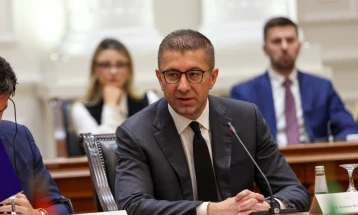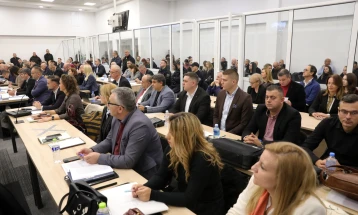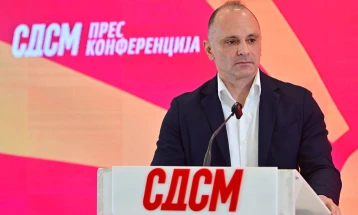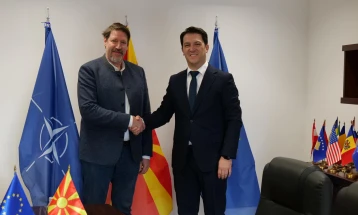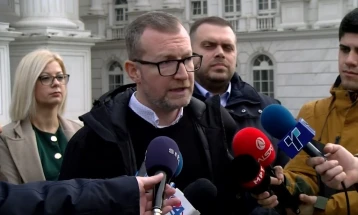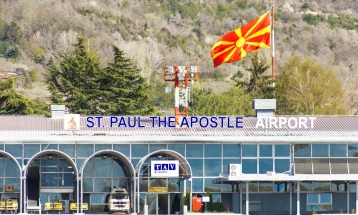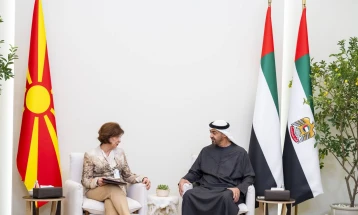Kovachevski: REK Bitola pillar of Macedonian energy, economy for 40 years
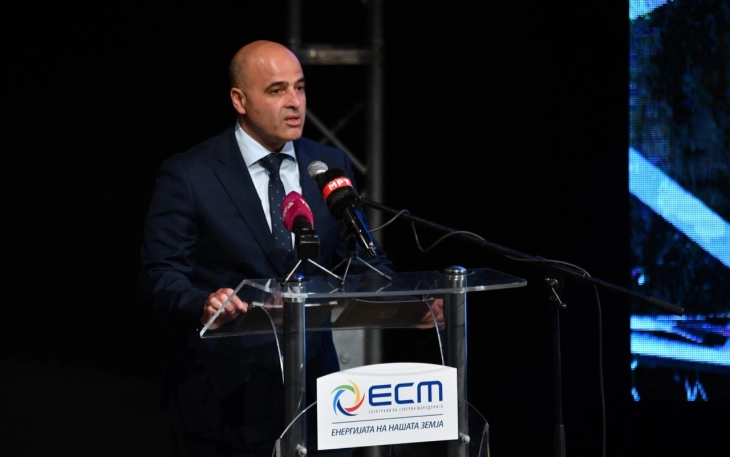
Bitola, 5 November 2022 (MIA) — REK Bitola has been essential for the independence of the Macedonian state; it was and still is the heart of Macedonian energy and the pillar of the Macedonian economy, especially now amid the largest global energy crisis, when the plant is the country’s dominant electricity producer, Prime Minister Dimitar Kovachevski said at the 40th anniversary of the commissioning of REK Mining and Energy Combine Bitola coal-fired power plant, which started its operations on Nov. 4, 1982.
“Currently, with our joint commitment, Power Plants of North Macedonia and REK Bitola have successfully and continuously met 100 percent of the country’s households and small consumers' electricity needs,” Prime Minister Kovachevski said.
He said the power plant in 2022 had increased its projected production by 25 percent compared to 2021. This, he added, showed the value of domestic energy production and of the employees’ hard work.
“Without their expertise, without their knowledge, without their dedication, and without their hard work none of this would have been possible. And it has been like that for 40 years,” Kovachevski said.
He also said the state had introduced measures to cushion the blow of rising energy bills.
“These anti-crisis measures, this subsidized electricity we are providing to our citizens and to 98 percent of the companies that employ the same number of employees, would not have been possible without REK Bitola’s electricity production,” he said.
“We are subsidizing the electricity for all households and small consumers by 80 percent, making sure their power bills are five times lower than the real market price they would be paying if we hadn't done this,” the PM said.
According to him, food producers will now be paying 80 euros per megawatt hour of energy, so they can stabilize their product prices.
“Producers have already announced at least a 10-percent drop in their prices,” Kovachevski said.
He added that schools would be paying 95 euros per megawatt hour, to ensure in-person classes were uninterrupted.
“We have provided the same electricity price for water utility companies to continue the uninterrupted supply of water,” he said, adding that health institutions were next to sign subsidy agreements.
Kovachevski also said REK Bitola was gradually being transformed from a coal-powered plant into a clean energy production capacity.
Despite the transition, he said, workers would keep their jobs.
“Don’t listen to those who say someone will close REK Bitola, or that the workers will be out of work. No worker will be left without a job,” Kovachevski said.
“On the contrary, REK Bitola will be modernized. REK Bitola should be using environmentally friendly fuels in the future, new sources of energy, and not only should it keep the existing ones but also employ new engineers specialized in renewable and sustainable energy sources,” he added.
The prime minister said the country had adopted a new energy development strategy, which was based on the European Green Deal.
“We are discussing and negotiating over one gigawatt in projects for the construction of photovoltaic and wind power plants with renowned large European companies. We support the European Green Deal for a sustainable economy, which involves turning climate and environmental challenges into opportunities and benefits for the state and citizens,” he said.
Kovachevski also said the construction of the natural gas interconnector with Greece, joining the country to the Trans-Adriatic gas pipeline to receive gas from Azerbaijan, would start in early 2023.
“A hard winter is ahead,” he said, “but our government has pledged that no one will be left alone to deal with the crisis and no one will have to choose between heating and eating.”
He said the country could rely on the support of NATO, the EU, and the countries of the Open Balkans. “We unblocked our road to Europe, joined NATO, and created an Open Balkans that has put North Macedonia in a completely different position than five years ago,” Kovachevski said.
At the Berlin Process Summit held a few days ago, he said, several important mobility agreements had been signed to bring the country closer to the EU and promote regional development.
“We discussed the European future of the region, but also North Macedonia's and the entire Western Balkans' energy transformation,” he said, adding that European Commission President Ursula von der Leyen and German Chancellor Olaf Scholz had expressed their full support.
“We jointly concluded that the European Union, Europe, is not complete without the Western Balkans and that our country will not go through this energy crisis alone. We, and this was stressed in Berlin once again, belong to the EU,” the PM said.
Kovachevski said the EU was North Macedonia’s future as well as its safety net and partner in dealing with the crisis.
“We were isolated for such a long time and after over a decade of stagnation,” he said, “now we are finally moving toward achieving our goal: EU membership.”
Ahead of the ceremony, the prime minister visited the coal plant's generator hall. mr/
